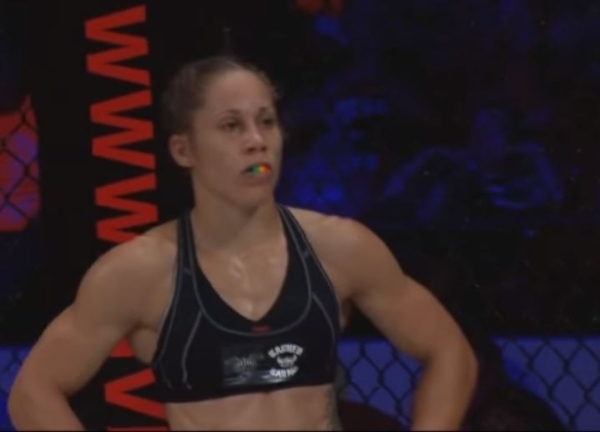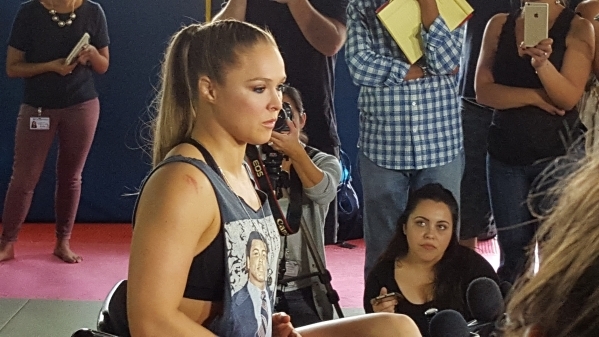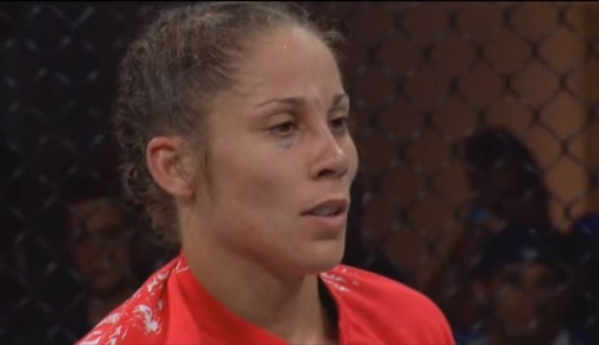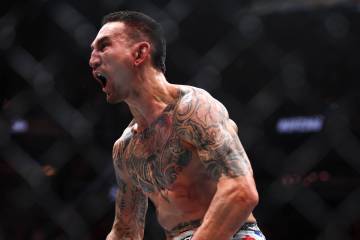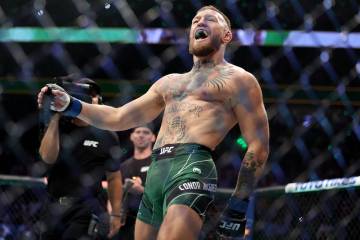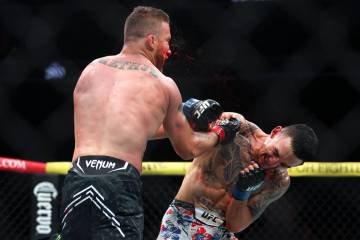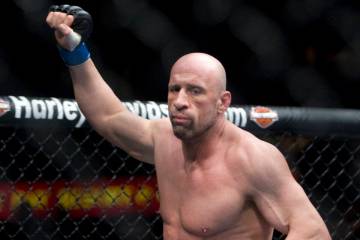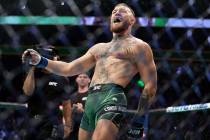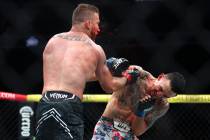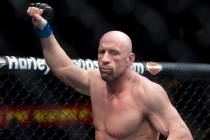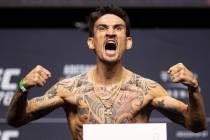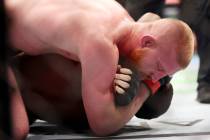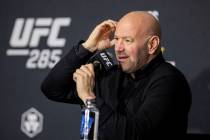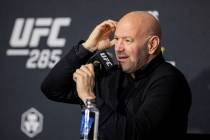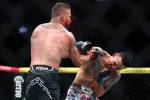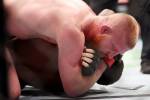The Liz Carmouche bout: Ronda Rousey’s first UFC opponent was nearly her first loss
Nobody would blame Liz Carmouche if she woke up every morning thinking, "What if?"
What if she could have squeezed tighter? What if a fight earlier in the night hadn't transpired in a way that gave her opponent a strategic hint? What if the night of Feb. 23, 2013, played out just a little bit differently?
What if Carmouche had beaten Ronda Rousey?
It's not some far-fetched, hypothetical scenario. Carmouche was the challenger the night Rousey, who already had been crowned the first women's champion in Ultimate Fighting Championship history, made her debut in the organization.
She almost pulled it off.
Carmouche was close enough to beating Rousey that it would be understandable if those "what-ifs" consumed her mind.
The ex-Marine, who served three tours of duty in the Middle East as a helicopter electrician, admits she still thinks about the world's most popular fighter. But Carmouche isn't dwelling on the missed opportunity as her former opponent fights Saturday in Australia. Carmouche is too focused on getting another chance.
"Every day I wake up, and my goal is to be better than I was the day before. Each day I go to train and I'm like, 'This is what I did well yesterday, and this is where I need to improve.' You try to make those improvements every single day, because given another opportunity, I know I can beat her," Carmouche said last month during lunch at a restaurant near the gym she owns in San Diego. "As long as she holds that belt, I want it, and that's not going to change."
Not only would she have already experienced life as champion, Carmouche also could have changed the course of the women's division and the entire sport with a victory that night.
The bout
It was the first women's fight in UFC history, headlining a pay-per-view event just over two years after the organization's president had famously told TMZ that women would "never" compete in the UFC.
Rousey, an Olympic bronze medalist in judo with Hollywood looks and a personality to match, forced his hand.
She already had a great deal of hype behind her, though she was hardly the international superstar she is today. Carmouche was essentially the sacrificial lamb UFC officials had placed in front of Rousey to showcase their new superstar.
But, in an instant, everything nearly changed.
After a bit of a scramble near the cage, Carmouche ended up on the back of Rousey, who was standing on her feet.
She got her arms around Rousey's face, but her hands were too high to lock in a choke. Carmouche instead went for a neck crank and applied all the pressure she could muster.
It just wasn't enough.
"At the time, I thought I was pretty close. Even if it meant I was going to have to snap her neck, I was going to do what I had to do," Carmouche said. "It was turning back pretty far. I definitely thought at that moment I had the finish. I was going to have her tap out or at the very least do enough damage that would cause the fight to end."
It may have also ended the meteoric rise of Rousey before it ever truly began. Rousey refused to tap, eventually shaking Carmouche off her back. Late in the first round, she locked in her trademark armbar and forced Carmouche to tap.
It was the last of seven straight first-round armbar submission victories for Rousey to start her pro career. It was by far the most difficult of those wins.
Rousey has insisted in countless interviews over the past two years she would have never submitted no matter how dire the circumstances became that night.
While she hung up on a conference call to promote her UFC 193 bout against Holly Holm on Saturday, Rousey recently told the Los Angeles Times just how much she was willing to endure.
"I dislocated my jaw, broke my sinuses and was coughing," she said. "When her hand went across my jaw, my mouth was ripped open. That's the only fight I got a bruise in."
In fact, Carmouche was putting so much pressure across Rousey's face and open mouth that she had nasty teeth marks in her arm.
Nothing could faze Rousey, though.
"The worse-case scenario is you break your neck, and my neck was past the place where it shouldn't have gone," Rousey told the Times. "It was in that moment I realized I was willing to die to win this fight. I was willing to be a quadriplegic to win that fight. It was that important to me. I didn't care. The thought of giving up never happened. You have to want it more than the other person."
Learning from mistakes
Rousey's toughness wasn't the only thing that kept her from losing that night. She also benefited from a fellow fighter's mistake earlier in the evening.
Ivan Menjivar found himself in a similar position to Rousey when Urijah Faber took his back as Menjivar stood near the cage. Rousey said Menjivar made the mistake of leaning back against the cage, holding Faber in place on his back. She said the error was fresh on her mind or she may have done the same thing, which she believes may have resulted in a different outcome.
Rousey's longtime coach, Edmond Tarverdyan, said one of Rousey's biggest attributes is that she's such a quick learner.
After a training session with his star pupil last month, he recalled the tense moments watching from outside the cage.
"It was dangerous, of course," he said. "But she can feel it differently than I can see it from the outside."
Tarverdyan said he and Rousey learned quite a bit from what nearly went wrong that night. There were technical lessons, certainly. Rousey's trouble began working along the cage, prompting Tarverdyan to add more training along the fence to future fight camps.
Mentally, the experience was invaluable.
"Anything can happen in that octagon. We learned from it, I learned from it. You have to be ready for anything," Tarverdyan said. "Being in a fight, crazy things can happen. But a great champion always shows that spirit to come back. Being in a dangerous situation like that, the general public sees somebody climbing on the back trying to choke you out, everyone's going crazy and Ronda's mouth is open and her head is turned to the side.
"(Carmouche) was a yoked girl, strong girl physically. Of course I felt scared and worried until Ronda just threw her and right away submitted her. I told her right away after the fight to never let someone get her back like that again, and she hasn't, not even in the gym."
Carmouche similarly tried to learn from the fight and quickly move on.
"I watched it twice after just to be able to understand what I did wrong and what I did correctly so I can make those changes in my preparation," she said. "But really, I watched it and I moved forward."
She has gone 2-2 since, beating Lauren Murphy by decision in April. She endured a fight camp plagued by injuries and personal issues, prompting her to pull out of a bout with Raquel Pennington in September. Carmouche said she is hoping to have her next fight lined up soon.
Rousey, meanwhile, will headline a stadium show with a title defense against Holm in Melbourne on Saturday at a venue with a capacity of almost 70,000.
Holm will be the next in the line of challengers to try to upset Rousey. Two years ago, the former professional boxing champ was preparing for her third professional MMA bout when she tuned in to watch the first women's fight in the UFC.
"I remember watching Ronda's fight against Carmouche. I remember for a split second thinking Liz might have it for a moment, but I wasn't thinking so much about the historical significance. I was seeing it like I do every other fight," Holm said by phone before leaving for Australia.
"Ronda was in the most sticky situation in that fight that she's ever been, and she dealt with it fine. She obviously knows how to think on her feet, she obviously knows how to fight through a bad position and not let it get to her mentally. That's what I took most from it. In a sticky situation, she still came out strong and finished the fight. It's definitely something to look out for."
Holm is on the verge of the biggest opportunity of her professional career largely because Rousey has been able to make women's bouts massive business. Holm, however, hasn't thought much about whether a Carmouche victory could have impacted her own future.
"I haven't thought about it in that way. Women are on the rise in a lot of areas, not just fighting. But in fighting, that fight alone definitely drove a lot of female MMA fighters. I think it helped make a difference. Nothing would ever be the same if you change something from the past," she said.
"I know that we'd be in a different situation here. I don't know that if Liz won that fight she would have been as dominating as Ronda is today. So I don't think if that fight ended differently, anything necessarily could be the same, but with Ronda being as good as she is, if Liz would have won, there would have been that other side of it that could have just driven fighters in a different way.
"I feel like Ronda's a huge reason of why we are here, but not the only reason."
Tarverdyan said he thinks Rousey's doubters would have been quick to pounce had she lost to Carmouche after receiving so much attention, but eventually his fighter would have found a way to get to this point anyway.
"A lot of people would have criticized the situation and said, 'What is this, they said she was awesome and was this or that and she lost.' It was the first event, the first female in the UFC, so there's so much hypothetical," he said. "But these things have happened before in boxing where someone was so built up and this and that and they lost. The great champions settle down, relax, get two or three wins and build themselves right back up. People work through it and show how tough they are, and they earn the respect of the fans. We've seen it before."
What if?
Who knows what would have happened and how the UFC would have reacted? But it doesn't matter because Rousey hasn't lost and has looked invincible since that night.
Rousey has also capitalized on her success outside the cage.
She is in commercials, movies, on magazine covers and just about anywhere you turn.
While Rousey has embraced, and even sought, the spotlight from Day One, it was an uncomfortable experience for Carmouche.
Carmouche had a small taste of that leading up to her fight against Rousey. The publicity tour included a UFC-produced reality show documenting the lives of the two fighters.
"In a lot of aspects, I wasn't ready at all. I wouldn't say I'm a social hermit, but pretty close to that," Carmouche said. "I was well aware of what I was getting myself into. I knew it was going to be a big deal. I certainly was prepared for that in a lot of aspects, but you can only prepare so much. I wasn't prepared for going to the grocery store the day after my fight, the same store that I've always gone to, and a lot of people coming up and knowing who I am.
"I didn't know that would happen just by having a fight."
The attention has died down some, but heats up anytime either Carmouche or Rousey has a fight. There's also the awkward moments when a new or prospective client walks into the gym and realizes it is indeed Carmouche there handling the day-to-day responsibilities of a small business owner.
"It makes it difficult sometimes because sometimes I just want to be me and not answer questions and not be 'the fighter,' " said Carmouche, who in 2014 purchased the gym she worked at and trained in while training for the Rousey fight. "I've been on a date and had people sit down and just join my conversation, and I'll just be like, 'Oh, boy, I didn't tell her I was a professional fighter, so I guess that's out the window.' "
Part of the marketing of the fight was Carmouche coming out as the first openly gay fighter in the UFC. While she didn't set out to make her sexuality a focal point at the time, she doesn't regret how the situation was handled.
Carmouche says she had full control over what was shared and to whom during the process. She credits the UFC and in particular White, who had been criticized for using gay slurs, for being supportive of her through the process and doesn't regret that part of her life becoming a storyline.
"What other fighters did they have where they could touch a community they hadn't really reached? Anybody who has any marketing sense would know that. They just capitalized on something that was there and something that I could offer," she said. "But at any time during that whole process, I had the opportunity to say I wasn't comfortable or I don't want to share this part of my life. At every point, the UFC would make sure I was OK with everything that was done in that regard. But, if anything, I absolutely wanted to be a part of helping bring a positive light to the community."
Carmouche may have even used the revelation to her advantage to gain a mental edge on Rousey. The champion has often said Carmouche was the only opponent who has been able to get into her head leading up to a fight.
She has hinted Carmouche essentially flirted with her in an effort to break Rousey's renowned focus.
Carmouche laughed at the suggestion.
"I wasn't hitting on her. I was definitely being flirtatious and joking," she said. "Flirting as in thinking I had a chance? It definitely wasn't that."
Carmouche was certainly all business once the fight started, and she nearly did what is now seen as unthinkable.
But she has moved on.
"There's always the what-ifs in every situation. I can live in the what-ifs and wonders, but that won't change my life at all," she said. "You can play the what-if game with anything in life. But everything happens for a reason.
"The outcome played out the way it should have."
Contact reporter Adam Hill at ahill@reviewjournal.com or 702-224-5509. Follow him on Twitter: @adamhilllvrj
RJ's new MMA site: CoveringTheCage.com
Las Vegas Review-Journal MMA reporter Adam Hill will bring online readers the following, with fresh content daily:
* Fighter profiles.
* Rankings of all UFC classes.
* Previews and coverage of bouts.
* Videos of fighters on and off the mat.



